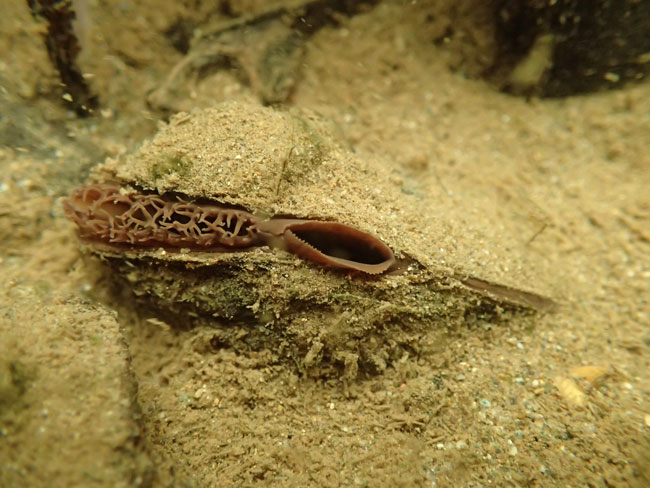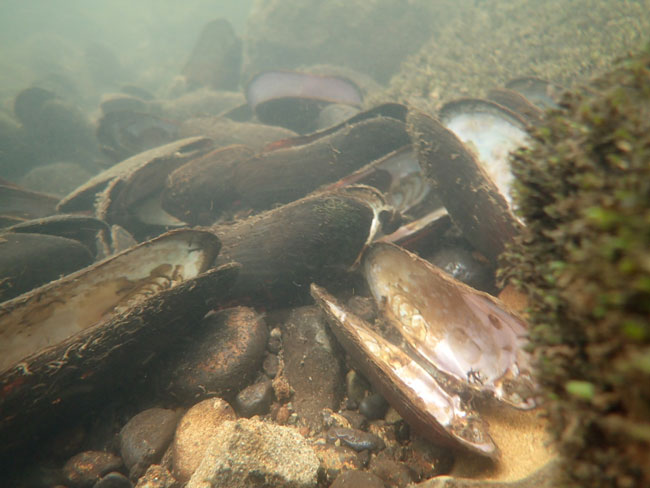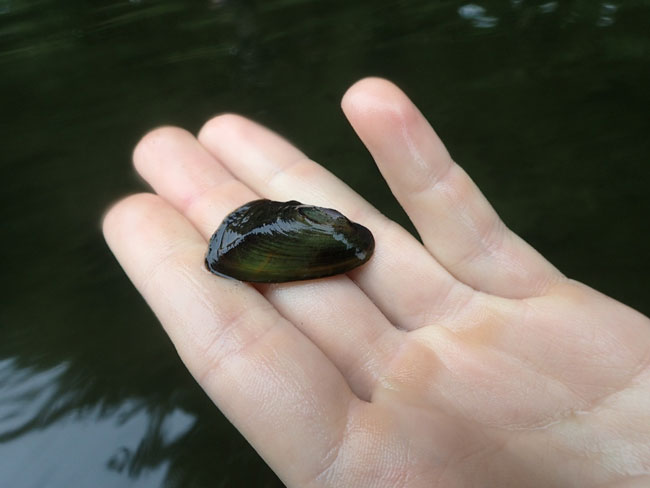When we talk about native freshwater mussels (not the invasive zebra mussels you’ve heard so much about), we often start by mentioning how obscure they are, that they look like rocks and live in places where they go largely unseen. It’s true that freshwater mussels aren’t as showy as butterflies, or as celebrated as bees, and yet they play a critical role in maintaining the health of the freshwater ecosystems we depend upon. Largely hidden, yet indispensable – developing a detailed picture of where freshwater mussels are, and in what numbers, is essential if we wish to protect them.

Of the more than 300 species of freshwater mussels in North America, largely represented by eastern species, 74% are considered imperiled, meaning that they have disappeared from certain areas, persist in only small populations, or have gone extinct. Our native species – the western pearlshell, western ridged mussel, and several species of floater mussels – are fewer in number and have received relatively less attention than eastern mussels and other western aquatic animals over the years, even though scientists began to note population declines in parts of the West more than 100 years ago. As early as 1912 Harold Hannibal, a paleontologist and malacologist from California, noted: “It is unfortunate that the records of [floater mussels] from southern California are few. The draining of ponds and lagoons and the use of river waters for irrigation so threaten to exterminate it that in a few years it will be almost impossible to obtain an adequate idea of its former distribution.” Since that time, biologists have continued to document the decline or disappearance of western freshwater mussel populations, and Hannibal was right. Understanding where mussels once occurred, and the places they are now found, becomes more challenging as populations shrink or disappear over time. Without an effort to document mussel populations across the west, past and present, it would be impossible to know whether freshwater mussels are declining or thriving.

Information on where mussels occur in the West has historically been scattered among research and museum collections, historical publications, and public agency or personal records. Nearly a decade ago, however, the Xerces Society began a project to gather this information in a central location. More than 160 people and nearly 100 institutions generously provided their observations or collection information to the Western Freshwater Mussel Database, a project of the Xerces Society and Confederated Tribes of the Umatilla Indian Reservation Mussel Project. Members of the Pacific Northwest Native Freshwater Mussel Workgroup have contributed thousands of records to the database, often revisiting mussel populations repeatedly over the years and documenting their observations.
Crowd-sourcing information about where mussels occur has enabled us to examine whether any freshwater mussel species are at risk of extinction, and to understand population trends at a much larger scale and over a much longer time period than individual observations would have allowed. With records from museums dating as far back as 1834 and collections and observations spanning from northern Mexico to Alaska, researchers from the Xerces Society, Confederated Tribes of the Umatilla Indian Reservation, and collaborators were able to use methods to assess range decline developed by the International Union for Conservation of Nature Red List.

This work, published today in the journal Freshwater Mollusk Conservation and Biology, has found what historical and regional studies have also suggested: freshwater mussels are being lost from waters across the West. As a whole, western mussels have disappeared from nearly 1 in 5 watersheds in which they once occurred, and more than one third of watersheds have lost one or more species of mussels. Among species, the western ridged mussel and winged floater are “vulnerable” to extinction (a status reserved for species that have already disappeared from more than 30% of their range, according to IUCN Red List criteria). The western pearlshell is “near threatened,” having disappeared from more than 15% of its range and suffering large declines in abundance elsewhere. Other species of floater appear to have fared better (the Oregon floater and western floater are together classified as “least concern”).

The causes for western freshwater mussel declines are not fully understood, but can likely be traced to our many impacts to freshwater and aquatic habitat. Our reliance on freshwater is evident – western waterways support agriculture, urban, suburban, and rural communities, industry, energy, and recreation. However, they are also home to freshwater mussels that clean our drinking water and improve habitat that supports fisheries and recreation. Unless we value and conserve freshwater mussels and their habitat, we stand to lose these benefits and the incredible animals that make our lakes and rivers richer and more beautiful.
Access to the article is available online here.
To learn more about the biology, ecology, and conservation status of western mussels, check out the IUCN Red List at http://www.iucnredlist.org/ and www.pnwmussels.org. If you’d like to share your observations of freshwater mussels, please contact us at [email protected]. Thanks to everyone who has contributed to this effort!



